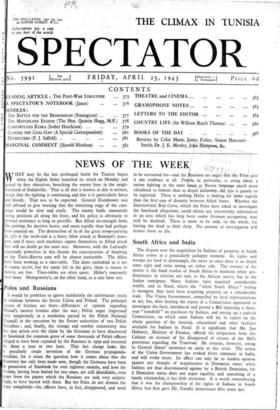Poles and Russians
S
It would be profitless to ignore indefinitely the unfortunate strain in relations between the Soviet Union and Poland. The principal causes of friction are three—differences of opinion regarding Poland's eastern frontier after the war ; Polish anger (expressed very temperately in a resolution passed by the Polish National Council) at the execution by the Soviet authorities of two Polish Socialists ; and, finally, the strange and sombre controversy that has just arisen over the claim by the Germans to have discovered at Smolensk the common grave of some thousands of Polish officers alleged to have been captured by the Russians in 1939 and executed by them a year or two later. This last charge looks like a peculiarly crude invention of the German propaganda- machine, for it raises the question how it comes about that the discovery has only been made now, though the Germans have been in possession of Smolensk for over eighteen months, and how the victims, having been buried for two years, are still identifiable, even apart from the papers which the Russians are said, very surpris- ingly, to have buried with them. But the Poles do not dismiss the story completely—the officers have, in fact, disappeared, and need to be accounted for—and the Russians are angry that the Poles give it any credence at all. Prakda, in particular, is using about a nation fighting in the same 'cause as Russia language much more calculated to foment than to dispel animosity. All this is greatly to be regretted. There is nothing Hitler is looking for more eagerly than the first sign of disunity between Allied States. Whether the International Red Cross, which the Poles have asked to investigate the Smolensk allegations, could obtain any trustworthy information in an area which has long been under German occupation, may well be doubted. There is more to be said, on the whole, for leaving the dead to their sleep. No amount of investigation will restore them to life.


























